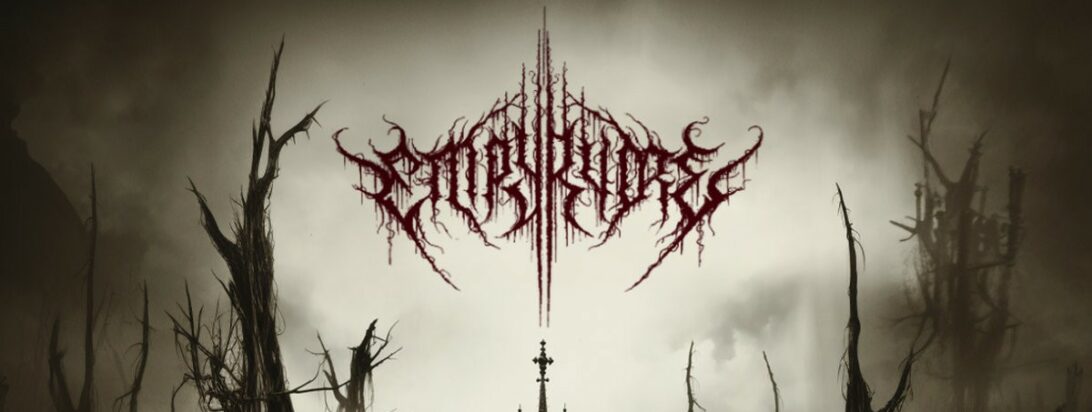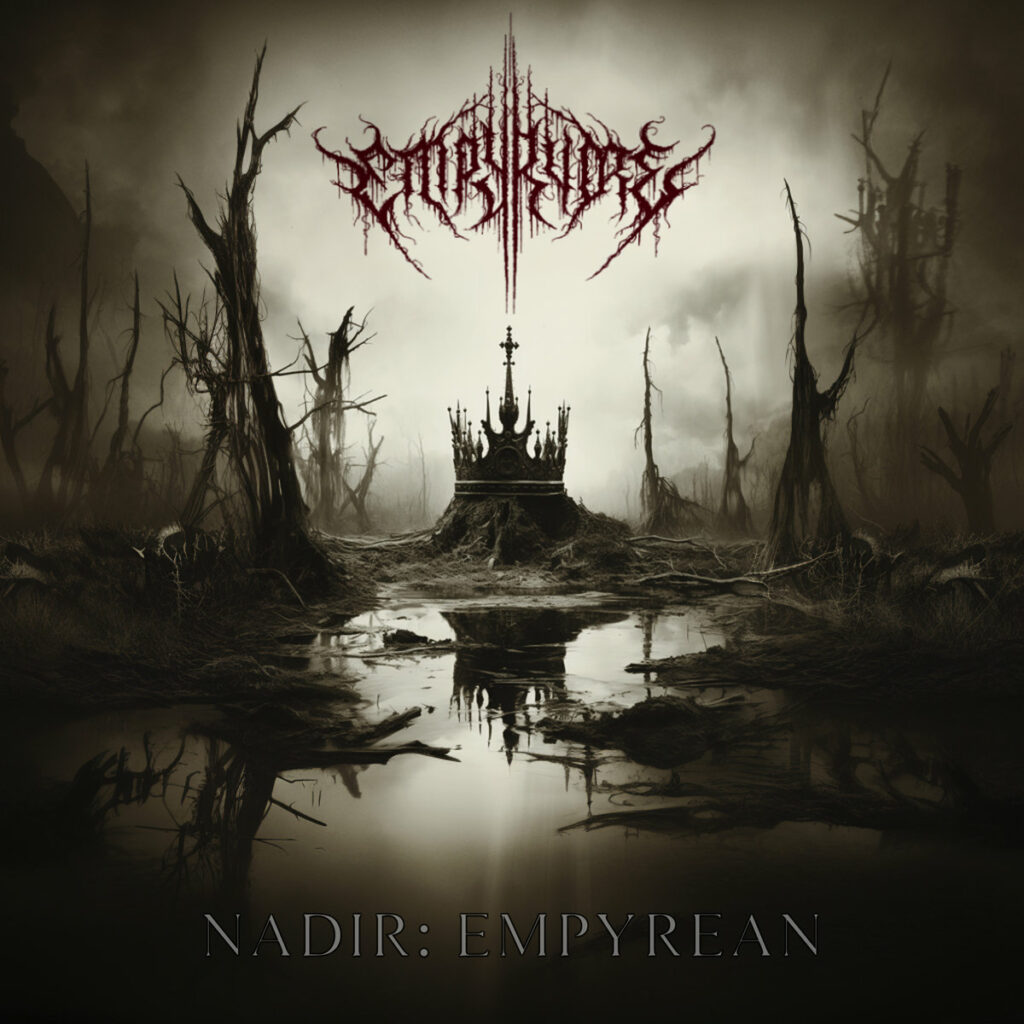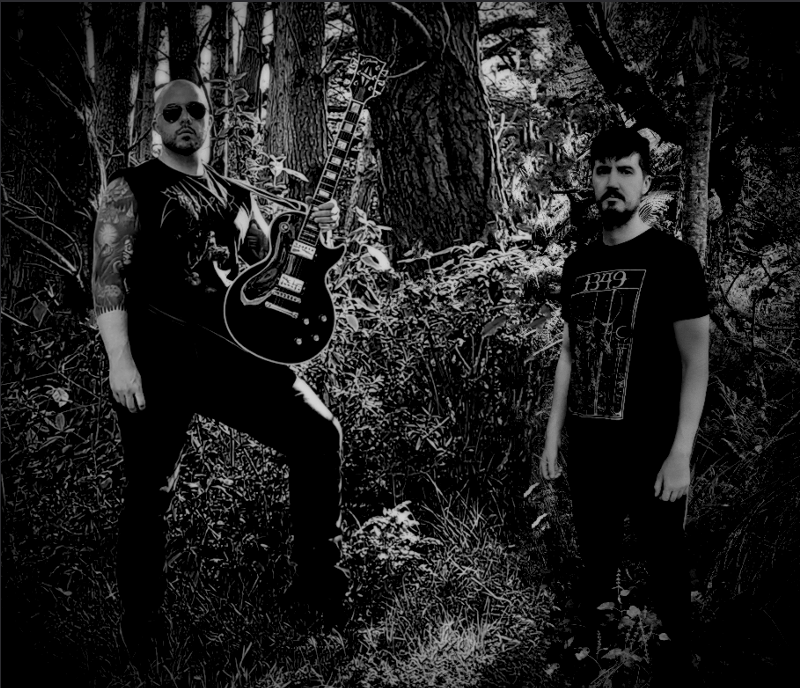‘The Eighth Note’ is 8 quick Questions with Wellington Musicians. A chance for us to catch up with people & see what they’re up to, or introduce you to a new musician/band and their music. ‘New Album’ is where a band or artist answers some questions about their latest release. Up next are Jared and Mike, from extreme metal band, Empyrvore, who have just released their sophomore album Nadir: Empyrean.
Who are you? Tell us a bit about your music:
We are Jared and Mike, members of a two-piece extreme metal band, Empyrvore, with a sound rooted in black metal. We initially met through training together at Powerhouse Gym and establishing we were both metalheads; and with Mike being a drummer and me being a vocalist/guitarist it seemed obvious to jam together. Mike moved around a bit and settled in Hamilton, but we were able to share files and have a similar enough ear for music to be able to continue to create music remotely, through a very iterative process. Empyrvore as a project is mainly black metal but with elements of doom, death and avant-garde music like Ulcerate or Portal. It’s intended to be posing questions and expressing emotion and frustrations, without falling into metal clichés. The name ‘Empyrvore’ is a portmanteau of empyrean (the highest point in Heaven) and the Latin suffix -vore meaning to devour, being a meta commentary on our collective predisposition to ruin the perfect or beautiful. It also has near-homonyms for ‘vampire’ and ‘emperor’ which thematically are helpful too.
Where is the best place people can follow you & find your music?
Mike: We’re on Spotify, YouTube and Bandcamp, with Spotify being the easiest place for people to check us out.
What have you been working on lately? Any new tracks or albums on the way?
We’ve just put out our second release, the album Nadir: Empyrean. It’s a series of questions and stories told through metaphor as expressions of ideas, with an overarching concept of epiphany and of travelling from the depths (the lowest point, the nadir) to the heights of Heaven (the empyrean). The two eponymous instrumentals that bookend the album are intended to evoke those two extremes, with the tracks in between fleshing out the journey. Thematically that’s why A Moment in Purgatory is near the middle, too. Musically it’s primarily modern black metal, with elements of melodic death metal. Uada and Mgła are influences you’ll probably hear, as are Opeth, with how we use clean passages as a musical device. It was entirely self recorded and produced, which was a huge challenge for us. Learning a new DAW as well as mixing multiple layers of vocals, harmony guitar lines, bass and a multitude of synths took a long time, but we’re really proud that what we’ve released is entirely our artistic vision.
What were the 3 most influential albums to you growing up?
Jared: Nine Inch Nails’ The Fragile, Tool’s AEnima, and Emperor’s Prometheus: The Discipline of Fire and Demise.
Mike: Wintersun – Self Titled, Dissection – The Somberlain and Nile – Annihilation of the Wicked.
Which other Wellington musician(s) would you most like to work with?
Jared: Beastwars for sure.
Mike: I’d say Bulletbelt or Dark Divinity.
What’s your favourite Wellington venue to play in?
Jared: San Fran is a fantastic venue facility wise, but the mana of Valhalla is impossible to beat.
In your songwriting or composing (or the band’s songwriting) how do the compositions and songs take shape?
Jared: Lyrically, the songs are an expression of ideas and often frustrations with our shared humanity, and I’m posing questions as much as offering views. To Bind the Wounds is an obvious example – it’s about a person (correctly) pointing out the failures of humanity, but not offering any insights into fixing those failures. The song asks the listener to question: can you point out problems without becoming one yourself and compounding peoples’ misery? That’s for the listener to decide, but these kinds of social frustrations and questions were the major driver of creating music, to act as an outlet for all the pent-up frustration we felt. There’s a lot of classical and literary influence in the lyrics – there’s references to the Bible, Tolkien and Lovecraft, Norse and Greek mythology, and a fair amount of Latin used throughout the album as well.
Musically, we deliberately eschew traditional song structures in favour of having music constructed to tell a story that compliments the lyrics – in Sic Semper Tyrannis for example, the three verses all drop sequentially lower in pitch as they progress and use gradually more dissonant sounding scales to compliment the lyrics telling a story of a revolutionary’s descent into tyranny. I do have scales that I prefer to reach for which are more modal or maudlin instead of the “classic” black metal sound (early Mayhem for example) which is more punk-y or sinister, and I’ll deliberately weave in neo-classical influences too, which compliments the use of classics in the lyrics. It’s important for me to offer dichotomies in the sound – light and heavy, clean and distorted, sung and instrumental, melodic and dissonant. I come from a tech-death background musically, but some of those bands give me a literal headache listening to an album since there’s no respite, and since concepts like heavy or fast don’t exist in a vacuum without aural contrast you lose a lot of the impact of those elements in your songs.
Mike: After some trial and error, we learned that our most effective means of writing music comes from Jared sending me a sequence of riffs which I will write drums to. From there I will give suggestions where I can and the drums I add may change how we choose to style the sound i.e. make it more dissonant, open-ended, or aggressive.. It’s a lot of back and forth between us being in different cities, however we’ve managed to get a really solid, streamlined process and have made amazing strides despite this. My background is a fairly even mixture of death metal, progressive metal and black metal, which lets me add some dynamic drumming for our music. I love getting to change the shape of how a riff is presented by adding intensity and creating a powerful, heavy overall sound.
When/where was the new album recorded?
Jared: All vocals, guitars, bass and synths were recorded at my Lower Hutt home, and the drums were recorded on an electronic kit in Hamilton and Mike’s place. Our workflow was to have near-final guitars for drums to be tracked to, and done as time allowed with full time jobs and families, so tracking was done from about March 2022-November 2022.
Who produced/engineered the album? How did the tracks come together in the studio, or at home?
Jared: The album is entirely produced and engineered by me. Song-writing starts with a riff or an idea, which I’ll refine and choose the right tuning and the right guitar for it. Then I’ll decide if it’s a riff that can carry an idea, or connect one, and that’s when it comes a verse or a bridge or something else. From there I’ll keep piecing things together until there’s a coherent structure for a song, then share it with Mike and we’ll work on how long each section should be and tempo, and those elements. We knew from the outset we wanted to tell stories individual to songs and then collectively across an album, which meant that by the time we came to record we already had agreed the structures and tunings and everything and so by tracking everything was set in stone, song composition wise. And since I knew what feeling I wanted to evoke in each passage, that was the driver for how I approached production, using synths to support different ideas. For building tension and adding sinister elements I’d use low drones, for hopeful or reflective sections I’d use overlapping vocal and choral sounds, and for grandeur and melody I’d use stringed instruments, etc.
Pulling all of these together and mixing them with atonal vocals, drums and sometimes eight different guitar parts was a real challenge, and I had to do a lot of work on understanding the right frequencies to remove and which of the competing melody lines to emphasise. That’s all mahi that would be normal workflow for an experienced engineer, but it was a lot of work to upskill and know that (say) if there needed to be more hi-hat in the mix then I shouldn’t just boost volume, it’s better to boost 4Khz instead, or whatever. Black metal classically has a DIY aesthetic so even when things got tough we still wanted to stick to that and be able to say it’s entirely down to the two of us.
Mike: Jared put in an absolutely immense effort to hone his skills in producing and we are both stoked that it is an entirely self-produced album. Towards the end of completing the album, I flew to Wellington and Jared and I went through an extremely gruelling 48 hours to fine-tune every blemish on the album and to get our desired sound. We are extremely happy with the outcome of it and it is a pure expression of the artistic vision we set out to create.
Was there any specific gear you used to capture that?
Jared: I used seven strings guitars tuned to G-standard to get a lot of the tonality you hear – it’s difficult to intonate and hold tuning between takes that low sometimes, but the effect on chords and melodies is huge, it’s a very different effect on the feel of the guitar lines. With tuning that low as well you also relieve tension on the strings which means they take on a different timbre. The end of Awaiting Bellerophon is a great example of how very low tunings and contrapuntal motion in the guitar lines can sound evil. The six-string songs use C standard on standard (non-baritone) scale lengths for that same effect, too. I also own one of the guitars that Opeth used to record Deliverance, Damnation and Lamentations, a 1993 PRS Custom 24 (not the same model, the actual same guitar). That’s the guitar you’ll hear on almost all of the clean passages, since it had such a beautiful voice for that music – it has just the right high-midrange emphasis to make clean passages sound clear, without being nasally.
Mike: I used a Roland TD-17KV e-drum kit. The responsiveness and dynamics of the kit are amazing and sound just like an acoustic kit. The great thing about using this kit to record with is that you don’t need a full studio mic setup, you can just hit record and you’re good to go. Having used acoustic kits in the past, I found little to no difference in the fullness of the drum sound and it complemented our music really nicely.
Is there a particular single/track that you feel captures the essence of the album? Are there any overall themes within the songs/album?
Jared: We are looking at making a video for Sic Semper Tyrannis – that’s a track which demonstrates a lot of the themes and techniques I’ve talked about, with combining the way lyrics and music can separately and corporately convey a message. Thematically it’s a story about a frustrated revolutionary who acquires power and ends up using that power in the same way that those they railed against did – it’s intended to be a critique of the idea a lot of us have that “things would be better if only I was in charge!”. That’s why the last verse uses lyrical devices changing things that are the same – “we trade the whip for the scourge; the yoke for the leash”.
There’s an overarching story through the album of travelling from the depths to the heights, from the nadir to the empyrean. That was a conscious decision to end on a more positive note to offer a different reflection from the classic metal ethos of negativity. It’s not that we don’t share that negativity or anger – we absolutely do and it drove us to create this album – but it’s about thinking a step ahead. If you don’t want to continue that anger, how do you help solve issues? Can you? The album poses a lot of questions but doesn’t seek to answer them all; it’s trying to take the listener on a journey to their own conclusions.
Where/when is your next gig?
Mike: We currently aren’t gigging due to living in different cities but with that situation potentially changing this year we’ll start working out the logistics of that – we’d love to gig the material but it would need a few extra session musicians or a lot of backing tracks and we’re working through what that process looks like.




